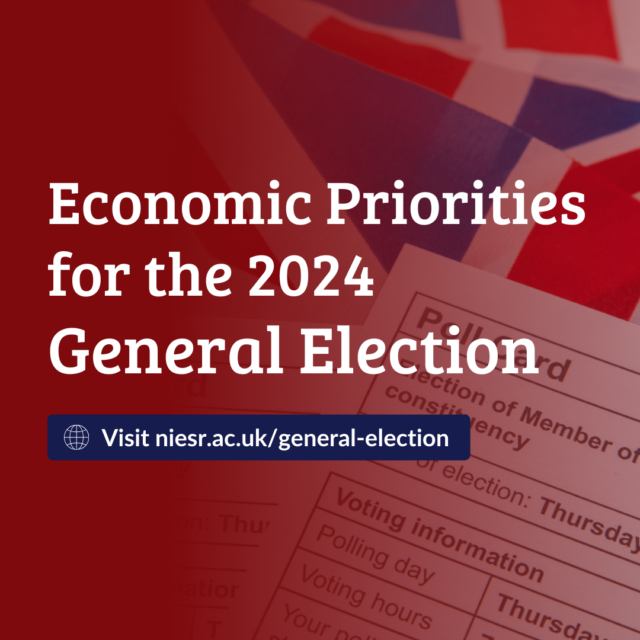Assessing Labour’s First Year
Last Friday marked a year in office for the current Labour Government. From an economic policymaking perspective, a lot has happened, though it has not been an easy nor a very successful year. Our Senior Communications Manager Luca Pieri asked our Interim Director Stephen Millard to help identify the things that need to change, and what the Chancellor should do to revive the UK economy.

One of the main themes of the year has been the Labour Government consistently talking about economic growth. What has happened on that front? And what indicators are telling is likely to happen in this second year?
The UK economy has shown poor productivity growth for a long time now – since the Global Financial Crisis in fact – and doing something about this poor productivity growth has been a central theme of the Labour Government. However, this is not something that can be improved quickly, and certainly not within the space of a year.
The ONS estimated that GDP grew by 0.9 per cent in the year to April 2025 (the most recent data we have available); this compares with GDP growth of 0.7 per cent in the year to June 2024 *just before they were elected). Neither figure is particularly great! Looking forward, our forecast in May suggested that we expect GDP to grow by 1.2 per cent in 2025 as a whole and by 1.5 per cent in 2026: better, but still lower than the 2 per cent plus that the government is aiming for. Again, though, to raise growth to this rate we need a prolonged period of higher investment – both public and private – and enough time for that investment to generate higher productivity. Unfortunately for the Government, that is quite likely to be well beyond the next election.
Public finances data has materialised worse than expected. What are the consequences of this for the Government when deciding which policies to adopt going forward?
When the Labour Government was elected, the Chancellor bound herself to two ‘fiscal rules’: the Stability Rule, which states that the current budget should be on course to be in balance or surplus by 2029/30, and the Investment Rule, which states that net financial debt should fall as a share of the economy in 2029/30. Although she was on course to achieve these rules – with £9.9 billion in headroom – at the time of the Spring Statement, lower growth and higher spending since that time mean that this headroom has been wiped out. The situation, in fact, has been made worse by the recent U-turns on winter fuel payments and personal independence payments. So, what can the Chancellor do?
Fundamentally, if you can’t increase borrowing – which is what the lack of headroom against the fiscal rules means – then you either have to reduce spending or raise taxes. Reductions in spending are likely to be impossible to achieve at the moment given the need to increase spending in certain areas, e.g., defence, the green transition, public infrastructure investment, not to mention public services, and the unwillingness of Labour MPs to accept cuts to welfare evidenced by the rebellion last week. But it will be just as hard to increase taxes, given the Manifesto and post-election pledges not to raise income tax, VAT and employee NICs. Increases in corporation tax and employer NICs would likely bear down on GDP growth – as we have already seen since the rise in employer NICs in April. And other taxes would simply not raise the revenue the Chancellor would need to raise!
So, with increased borrowing, reductions in spending and tax rises all proving difficult the Chancellor is left in the position where something has got to give; what does will be a tough political decision.
Another mission of the Labour Government is to raise living standards in every part of the country. How is the Government faring on this point? Have you seen any sign of policies which could lead to a tangible improvement of living standards come the end of the current parliament in 2029?
Rising living standards generally are tied into rising economic growth. If UK citizens in aggregate are going to become better off, the UK economy needs to grow faster, so I would refer you back to my earlier answer. Having said that, the Government have looked to raise the standard of living for poorer households through the uprating of Universal Credit and increases in the National Living and Minimum Wages. Against that, fiscal drag – resulting from the freezing of income tax thresholds until at least April 2028 – has resulted in increases in income tax for all workers, hitting those at the lower end of the wage distribution hardest. And the rise in employer NICs has led to a reduction in vacancy posting, making it harder for unemployed workers to find jobs. Welfare reform was supposed to help get people back into work, but there still has not been enough money set aside for funding the right skills and training programmes necessary to ensure this would work.
In terms of regional regeneration, the Government has announced a number of investment projects in housing, transport and defence (in particular) that should help raise incomes in some of the less prosperous regions of the United Kingdom. The new Affordable Homes Programme is particularly welcome, though it will be key to make sure that investment in transport infrastructure supports this. This investment – together with planning reform – should have a positive effect on living standards over the medium to long term. Whether we will see tangible improvements by the end of this parliament is less clear.
Finally, what would you like to see the Government do in this second year? And also, what should they avoid doing?
I would like to see a continued emphasis on public investment – particularly in infrastructure, the green transition, education and skills and health and social care – and productivity growth. In that light, it will be interesting to see how the Industrial Strategy published on 23 June plays out in practice.
Of course, increased public investment requires increased funding and this means that the Government will have to bite both bullets of raising one of the main taxes – income tax and/or VAT – and rethinking the fiscal framework and the fiscal rules. The former will be extremely difficult politically and require the government to make the case that if people want to see better public services then they will have to pay for them. Can it do this without losing a lot of voters? Possibly not. But to my mind the point of governing is that you are prepared to take these difficult decisions and make these difficult cases to the voters. Changing the fiscal framework will also be extremely difficult as the Government will need to make the case to the financial markets that – despite having to raise borrowing – they remain financially sound. Can it do this without seeing higher bond rates? Again, possibly not. But, again, the situation we have seen this year, where the media and the Government spend their time concentrating on what the OBR forecasts rather than on what the Government needs to do to raise growth and living standards cannot continue for the next four years. It is up to the Government to change this.









